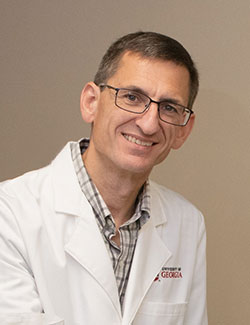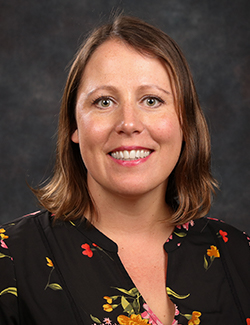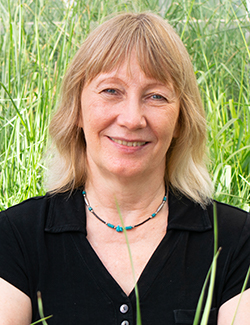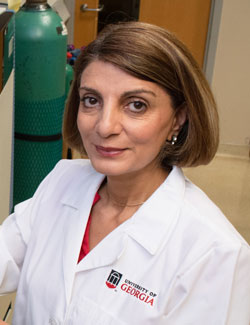Breeanna Urbanowicz
Short Biography:
Dr. Urbanowicz received her B.S. in Biology in 2001 from Purdue University and her Ph.D. in 2008 from Cornell University. Prior to her junior faculty position at the Complex Carbohydrate Research Center, Dr. Urbanowicz was a Postdoctoral Fellow (2008-2013) in the Department of Biochemistry and Molecular Biology at the University of Georgia.
Research Interests:
Biological molecules, including proteins, polysaccharides, and nucleic acids, are assembled to create complex structures with biochemical and biomechanical properties that are greater than the sum of their parts. My current research focuses on understanding the structure and function of plant carbohydrate active enzymes involved in polysaccharide biosynthesis and modification. Plant cell walls are complex macrostructures comprised of cellulose, hemicellulose, and pectins, together with lesser amounts of protein and phenolic molecules. These components assemble and interact with one another to produce dynamic structures with many capabilities, including providing mechanical support to plant structures and determining the size and shape of plant cells.
The research of my group focuses on understanding the integral steps in the molecular pathways used by plants to synthesize complex polysaccharides. A key area of interest is development of methods to express and analyze recombinant plant enzymes, which has allowed us to investigate plant biochemical pathways in vitro. We have now generated a large collection of recombinant enzymes that are able to catalyze highly specific, covalent modifications of polysaccharides, which we utilize as nature-inspired molecular tools for targeted functionalization and labeling of glycopolymers that greatly expand our toolkit for producing glycopolymer-based products with valuable properties.
• High throughput expression of plant biocatalysts. In collaboration with Kelley Moremen at the CCRC, we have designed and evaluated over 75 constructs for heterologous expression in HEK293 cells encoding plant glycosyltransferases (GTs) from diverse families in addition to both polysaccharide O-methyltransferases (O-MTs) and O-acetyltransferases (O-AcTs). Assessment of these constructs for both protein expression levels and retention of in vitro activity determined that this is a robust heterologous expression system for plant derived enzymes. We have applied this system to the in vitro synthesis of decorated hemicellulosic polymers, resulting in the first proof-of-concept generation of enzymatically synthesized, high degree of polymerization (DP), substituted plant polysaccharides in vitro (Urbanowicz et al., 2014).
• Polysaccharide Methyltransferases. We have shown that Arabidopsis GXMT1 encodes a glucuronoxylan (GX)-specific 4-O-methyltransferase responsible for methylating 75% of the GlcA residues in GX isolated from mature Arabidopsis inflorescence stems. Reduced methylation of GX in gxmt1-1 plants is correlated with altered lignin composition and increased release of GX by mild hydrothermal pretreatment (Urbanowicz et al., 2012). The ability to selectively manipulate polysaccharide O-methylation may provide new opportunities to modulate biopolymer interactions in the plant cell wall. We are currently investigating the role of other members in this family on polysaccharide methyletherfication.
• Investigating the mechanism of polysaccharide O-acetylation. Despite the high degree of O-acetyl substituents found in plant glycopolymers, the biochemical and mechanisms of polysaccharide O-acetylation employed by plants are still lacking. An unsolved question is the source of the acetyl group used by acetyltransferases. We have developed robust methods to biochemically analyze O-acetyltransferases and are applying these techniques to investigate the molecular details of polysaccharide methylation.
Debra Mohnen
Short Biography:
Debra Mohnen is a Distinguished Research Professor at the Complex Carbohydrate Research Center, as well as the Department of Biochemistry and Molecular Biology at the University of Georgia. Dr. Mohnen received her B.A. in Biology (1979) at Lawrence University, Appleton, WI and her M.S. in Botany (1981) and Ph.D. in Plant Biology (1985) from the University of Illinois, Urbana, IL, with research conducted at the Friedrich Miescher Institute, Basel, Switzerland. Prior to joining the CCRC, she carried out five years of postdoctoral research at the CCRC and USDA, ARS, Russell Research Center in Athens, Georgia. Dr. Mohnen has served as Chair of the Plant Cell Wall Gordon Conference and since 1990 has lead a research team focusing on pectin synthesis, structure and function, with emphasis on the role of pectin glycan domains in wall architecture and plant cell growth. In 2008 she was awarded the Bruce Stone Award for research in pectin synthesis and elected as a fellow of the American Association for the Advancement of Science in 2013. Her research on synthesis of the two pectin glycan backbones, homogalacturonan and rhamnogalacturonan, led to the discovery of the GAUT and RGGAT families of glycosyltransferases and the recognition that pectin exists and functions as a family of glycan domains in cell wall heteroglycans and glycoconjugates. Since 2007 part of her research has been directed at improving plant biomass yield, sustainability and composition for the production of biofuel and biomaterials. As Focus Area Lead of Plant Biomass Formation and Modification in the DOE-funded BioEnergy Science Center (BESC), she directed a team of researchers aimed at understanding and overcoming biomass recalcitrance to deconstruction and since 2017 she serves as Research Domain Lead for Integrative Analysis and Understanding in the Center for Bioenergy Innovation (CBI). Her current efforts are focused on a new model for pectin function in cell expansion and wall structure.
Research Interests:
Dr. Mohnen’s research focuses on the biosynthesis, function and structure of plant cell wall polysaccharides and glycoconjugates, with emphasis on pectin, matrix polysaccharides and wall proteoglycans.
The research goals include:
*Understanding the structure, biosynthesis and function of wall polymers that contain pectic glycans.
*Improving plant growth and development, and the use and conversion of plant cell wall biomass to biofuels and bioproducts, through modification of wall structure and synthesis.
*Reevaluation of plant cell wall models based on recently identified wall matrix glycan-containing proteoglycan structures, and glycosyltransferase gene family member functionalities, that are inconsistent with current wall models.
The research includes biochemical, chemical, molecular genetic and genomic methods and use of both model systems (e.g. Arabidopsis and rice) and biomass feedstock (e.g. Populus and switchgrass).
Parastoo Azadi, Ph.D.
Short Biography:
Dr. Azadi received her B.Sc. in Chemistry in 1987 from University of North London, UK and her Ph.D. degree in biochemistry in 1991 from Imperial College of Science and Technology, University of London, studying structural characterization of carbohydrates and glycoproteins by mass spectrometry under the supervision of Profs. A. Dell and H.R. Morris.
In 1990 through to 1994 she was the senior scientist and the study director at M-Scan limited, an Analytical Mass Spectrometry Consultancy in UK where she was responsible for complete structural characterization of native and recombinant proteins and glycoproteins using mass spectrometry as a service to the pharmaceutical industry.
In 1994 she joined the Complex Carbohydrate Research Center as a postdoctoral fellow and studied the effect of the enzymes endohyrolase and endolyase on rhamnogalacturonan I, and characterization of the fragments produced by these enzymes by ESI-MS and ESIMS/MS. In 1996 she became the Associate Technical Director of plant and microbial Analytical Services at the Complex Carbohydrate Research Center where she was responsible for plant and microbial service program where polysaccharides and lipopolysaccharides were analyzed for other institutes.
Since 2001, Dr. Azadi has been the Technical Director of Analytical Service and Training at the Complex Carbohydrate Research Center. As the Technical Director, the she oversees and manages all analytical services and training conducted at the CCRC, which are supported by three federal resource centers of excellence that CCRC has been awarded: The Department of Energy-funded Center for Plant and Microbial Complex Carbohydrates, the National Institutes of Health Resources Center for Integrated Glycotechnology, and the National Institutes of Health for Biomedical Glycomics. The analytical service program offers two main areas of service: standard analyses and contract analyses. The samples submitted for these types of analyses come from academic, government, non-profit organizations and private companies, throughout the United States and internationally.
Dr. Azadi works closely with the research scientists in industry on developing carbohydrate based drugs and the need for out-sourcing prior to phase I and phase II clinical trials.
Her laboratory also conducts research in areas of structural characterization of plant, bacterial and animal polysaccharides, glycoproteins and glycolipids using MS and NMR techniques.
Research Interests:
Structural analysis of oligosaccharides, glycoproteins, polysaccharides and glycolipids by mass spectrometry.





